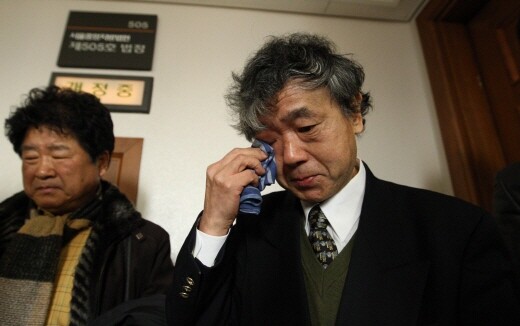hankyoreh
Links to other country sites 다른 나라 사이트 링크
Japanese reporter cleared of espionage charges

A Japanese reporter who was sentenced to 20 years in prison on charges of giving money to activist students to conduct espionage activities for North Korea in 1974 was acquitted in a retrial Wednesday.
The troubles of Tachikawa Masaki, the 65-year-old former reporter for the Japanese newspaper Nikkan Gendai, began when he gave 7,500 Won to a university student being sought by the police. Masaki came to South Korea to cover the student protest against the Yusin Constitution, and interviewed Seoul National University student Yu In-tae, who would later be sentenced to death in the Mincheong Hangnyeon Incident, in his motel room in April of 1974. When Yu told him about how difficult things had become and that he was surviving only on ramyeon, Masaki handed Yu 7,500 Won, telling him to treat himself to the Korean beef dish bulgogi. The money was labeled as North Korean operational funds during a later investigation, and Masaki was labeled a foreign spy taking orders from North Korea. He could not bear to look at his father and wife as they sat in the audience of a foreign military court.
Masaki was freed just 10 months later, but his life lay in ruins around him. His wife fell mentally ill from the shock and stress of the trial, and his father, who was suffering from Alzheimer’s Disease, kept repeating “It is unfair” just before his death. His three-year-old son drowned while his wife stepped away for one moment in her deteriorated condition.
Some 36 years later on Jan. 27, 2010, the Seoul Central District Court acquitted Masaki of charges of instigating civil disorder and violating the Anti-Communist Law, and dismissed charges that he violated the Emergency Act. The bench said the reason Masaki cited in requesting the retrial has some basis, given that he was told by prosecutors that the trial was only a formality and that he needed to admit to the charges to return to Japan and hence seemingly confessed. In the audience, Japanese reporters from the Asahi Shimbun, Tokyo Shimbun, Kyodo News and TBS watched as their senior reporter’s stain was removed.
When asked if South Korea could be forgiven, Masaki responded that for 36 years, he harbored bad memories, but deeply respects the South Korean people’s deep faith in democratization. He also said he has learned a great deal from the many good South Koreans he has met, and that South Korea is a good country, requesting that ill not be spoken of it.
Please direct questions or comments to [englishhani@hani.co.kr]
Editorial・opinion
![[Guest essay] The real reason Korea’s new right wants to dub Rhee a founding father [Guest essay] The real reason Korea’s new right wants to dub Rhee a founding father](https://flexible.img.hani.co.kr/flexible/normal/500/300/imgdb/original/2024/0423/8317138574257878.jpg) [Guest essay] The real reason Korea’s new right wants to dub Rhee a founding father
[Guest essay] The real reason Korea’s new right wants to dub Rhee a founding father![[Column] ‘Choson’: Is it time we start referring to N. Korea in its own terms? [Column] ‘Choson’: Is it time we start referring to N. Korea in its own terms?](https://flexible.img.hani.co.kr/flexible/normal/500/300/imgdb/original/2024/0423/3617138579390322.jpg) [Column] ‘Choson’: Is it time we start referring to N. Korea in its own terms?
[Column] ‘Choson’: Is it time we start referring to N. Korea in its own terms?- [Editorial] Japan’s rewriting of history with Korea has gone too far
- [Column] The president’s questionable capacity for dialogue
- [Column] Are chaebol firms just pizza pies for families to divvy up as they please?
- [Column] Has Korea, too, crossed the Rubicon on China?
- [Correspondent’s column] In Japan’s alliance with US, echoes of its past alliances with UK
- [Editorial] Does Yoon think the Korean public is wrong?
- [Editorial] As it bolsters its alliance with US, Japan must be accountable for past
- [Guest essay] Amending the Constitution is Yoon’s key to leaving office in public’s good graces
Most viewed articles
- 1[Column] ‘Choson’: Is it time we start referring to N. Korea in its own terms?
- 2Why Korea shouldn’t welcome Japan’s newly beefed up defense cooperation with US
- 3Senior doctors cut hours, prepare to resign as government refuses to scrap medical reform plan
- 4[Guest essay] The real reason Korea’s new right wants to dub Rhee a founding father
- 5[Column] The clock is ticking for Korea’s first lady
- 6Opposition calls Yoon’s chief of staff appointment a ‘slap in the face’
- 7Terry Anderson, AP reporter who informed world of massacre in Gwangju, dies at 76
- 8New AI-based translation tools make their way into everyday life in Korea
- 9Samsung barricades office as unionized workers strike for better conditions
- 10Korean government’s compromise plan for medical reform swiftly rejected by doctors